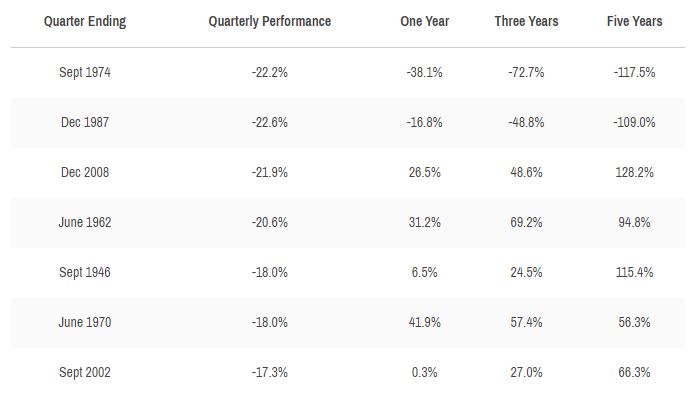Market Declines Are When Investors Do Their Hardest Work
We’ve narrowed the scope of our quarterly perspective to focus squarely on the predominant issue that is on many investors’ minds at present — the current (and certainly temporary) bear market for global equities.
The good news is that as a Rockwood client, you already understand that bear markets are a perfectly normal feature of the stock market. Without them, there would be no real volatility and therefore no equity risk premium (higher long-term returns from stocks above cash equivalents). As investors, we wouldn’t like that one bit … not even a little.
If we were to look back at every other market decline, we would see there were plenty of noisy “investors” who were emphatically forecasting the coming financial apocalypse from which no market could recover. Perhaps unsurprisingly, they were wrong. They were wrong every single time. In each instance, their fearmongering amounted only to the production of unnecessary anxiety for anyone foolish enough to buy into their crapola.
The recent crescendo of noisy nonsense reminds us that it’s the right time to revisit the most crucial tenets of behavioral finance. As a reminder, behavioral finance is the study of the effects of psychology on investors and financial markets. The field focuses on explaining why investors often appear to lack self-control, act against their own best interests, and make decisions based on temporary and personal biases instead of evidence.
Let’s start here: irrespective of news cycles about inflation, conflict in Ukraine, supply issues, etc., etc., it continues to hold categorically true that permanent loss of capital in a well-diversified portfolio remains a purely human accomplishment.
Said differently, properly diversified portfolios, in spite of frequent temporary declines, have always roared back to levels surpassing their pre-bear market lows. The issue is not that markets all of a sudden are acting differently than their natural state; the issue is that it is the investors who can sometimes get in their own way. The words that follow are crafted myopically to ensure that does not happen to you or those you care about.
Some will always say, “This time is different” as a mantra for rationalizing their wealth-crippling behavioral finance mistake of selling stocks in a bear market. Quite obviously, every market decline of any magnitude has its own unique precipitating causes. What is not different is that equity prices always go back up.
“Think of the stock market as a cauldron of minestrone soup that occasionally somebody sticks a ladle in and stirs up; it takes a while before all the vegetables float back to the level that they were at before.”
To stretch his metaphor a bit, no one in their right mind would throw away the soup because they were too impatient to wait for the vegetables to float back up to the surface. However, some stock investors seem to be unable to embrace even a little bit of delayed gratification.
The ladle that stirs the soup is always different. We think it’s fair to say (although we will never know for sure) that the current pot-stirring episode is a response to two central issues: persistent inflation, and the extent to which the economy might be driven into recession by the Federal Reserve’s struggling efforts to root out that inflation. For seasoned investors, of course, the cause of the transient decline isn’t really the point. Our firm’s investment policy is founded on acceptance of the idea that the only way to be reasonably assured of capturing the return premiums above inflation to which investors are entitled is by riding out the occasional and sometimes steep declines in asset prices.
The financial research firm DALBAR maintains a longitudinal study of investor behavior, updating the results annually. By measuring the inflows and outflows of investment vehicles, DALBAR’s research reveals that market-timing actions decrease an investor’s long-term investment returns by about 25% when compared to those who simply ignore their portfolio. The DALBAR evidence reinforces what we all know intuitively: investors are terrible at market timing. Investors who attempt to time the market would be better off doing literally the exact opposite of what their emotions tell them to do.
The Job Description
“They would be better off doing literally the exact opposite of what their emotions tell them to do.”
Shifting metaphors a bit, we think it is helpful to think of long-term investing as an occupation of sorts, one where a worker does work — and then is rewarded for that work with a paycheck. Market declines are when investors are asked to do their hardest work. That hard work centers on resisting behavioral finance mistakes and focusing on strategic actions such as tax-loss harvesting and rebalancing.
Declines of 5%–10% probably don’t feel like much work at all. They’re akin to emptying the dishwasher or taking out the trash. These declines occur so frequently (a few times a year) and can come full circle in as little as a few weeks. Most investors who aren’t incessantly looking at their phones every day might not even notice these brief declines.
Declines of 10%–20% are where the hard work starts; perhaps this is akin to spreading mulch or splitting and stacking firewood. Investors can work up a sweat here, as they may start to worry, and could even begin to second-guess themselves. They might even wonder if there was something they could have done, just this once, to avoid the temporary loss in their portfolio.
Declines of 20% plus are the hardest work of all. Stretching our own metaphor now a bit, we’re firmly in ditch-digging and rock-breaking territory. That feels like where we find ourselves today. These declines usually correspond with an anticipated economic downturn, as is the case now, when it appears that a recession is already “priced in” to today’s stock prices. To provide context for the hard work needed, we find that most investors we meet don’t realize that the average intra-year correction of the US market is -14%. Said differently, the market falls by an average of 14% every year.
The Paycheck
Anyone who has examined stock market data with an empirical lens has concluded that expected market returns are quite robust after a bear market. Let’s refer to those higher expected returns as “the paycheck.” So why do ill-advised investors often put in the work but fail to stick around to collect their paychecks? It seems patently unfair when every past decline looks like an incredible opportunity.
S&P 500 Since 1945 | Forward Performance

The reason, of course, is that although past declines look like amazing opportunities, every current decline feels like a tornado of unmitigated risk.
Let’s take a look at some historical paychecks. The table above shows the worst-performing calendar quarters in the US market since 1945 and the returns that followed. (Please note we did not include Q1 2020 due to incomplete three- and five-year time periods.)
While every period certainly had unique circumstances, what stands out is the outsized returns following these large declines. For investors, this is the paycheck for the work of unrelenting emotional control.
The Paradox of the Work/Pay Relationship
In a traditional work/pay relationship, payment is typically rendered biweekly. A worker puts in hard work, and a paycheck shows up nearly immediately thereafter. Paradoxically, the work/pay relationship in investing is completely the opposite — which is at the core of why it is so hard for some to remain disciplined investors.
The reason investing is not easy is that it is difficult for most individuals to control their emotions — emotions of greed and envy in bull markets and fear and panic in bear markets. Often, bear markets are the mechanism that serves to transfer assets from those with weaker stomachs and no strategy to those who are well advised and have stronger stomachs and a well-formulated strategy.
“You make most of your money during a bear market; you just don’t realize it at the time”
You are firmly a member of the latter group, as you have an empirically derived investment strategy supported by a globally diverse, balanced, risk-aware portfolio. In other words, you’ve planned well. You are exactly who Shelby Davis was thinking about when he said, “You make most of your money during a bear market; you just don’t realize it at the time.”
A Bit of Empathy
Like us, if you care about the well-being of others, it is hard to stomach seeing again and again that some investors just can’t seem to avoid selling stocks after prices have fallen. Sadly, the ill‐advised retail investor seems to retain the stubborn predisposition for taking the risk but bailing out before the return. We want to keep you in a bubble where you don’t make mistakes. The plight of the ill-advised investor makes us want to drive down your street, set up a speaker system, and shout with electronically augmented passion, “This is a group of boneheads that you never want to join!”
Perhaps it would be a bit more courteous if we simply continued to refine our ability to be a steady, sensible guiding hand to help you navigate the emotions associated with investing in the capital markets enroute to your most closely held financial goals.
John, a New Hope, Pennsylvania native, is the Founder and CEO of Rockwood Wealth Management. A former nuclear engineer, he is committed to the development and growth of conflict-free comprehensive financial planning and investment management. John values a client-centric practice and unwavering integrity in all of our endeavors as stewards of our clients' best interests.

